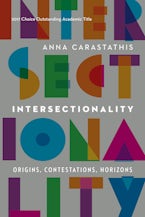“This is, perhaps, Carastathis’s greatest insight: she urges us to think about intersectionality as a ‘profoundly destabilizing, productively disorienting, provisional concept’ whose work remains to be done. In this account, intersectionality refers to our desire to keep dreaming of a more just social world.”-Jennifer C. Nash, American Quarterly
"Intersectionality follows a clear theoretical arc and stages multiple interventions throughout, making it a resource for one well versed in the field or encountering it for the first time."-Desiree Valentine, Critical Philosophy of Race
"Anna Carastathis confronts an enduring obstacle to taking up intersectionality's potential: she illustrates how an ongoing, monist fragmentation of identities, communities, politics, and perceptions buttresses power hierarchies and reinforces exclusion by design."-Vivian M. May, Hypatia: A Journal of Feminist Philosophy
“Better theory is what Carastathis wants, and that implies for her a more fundamental critique of naturalized and essentialized groups and a ‘profoundly destabilizing, productively disorienting, provisional concept that disaggregates false unities, undermines false universalisms, and unsettles false entitlements.’”-Myra Marx Ferree, Contemporary Sociology
"Carastathis’s citational practices and the subsequent conversations she generates are a vital intervention in this current moment in academia. For both novices and experts in black feminist theories, this book is a crucial review of the literature for all academics at any stage of their career, especially those scholars naming their work as 'intersectional.'"-R. Aliah Ajamoughli, Journal of Folklore Research
“Anna Carastathis’s careful and sustained engagement with KimberlÉ Crenshaw’s work is uniquely illuminating and helpful.”-Zenzele Isoke, author of Urban Black Women and the Politics of Resistance

